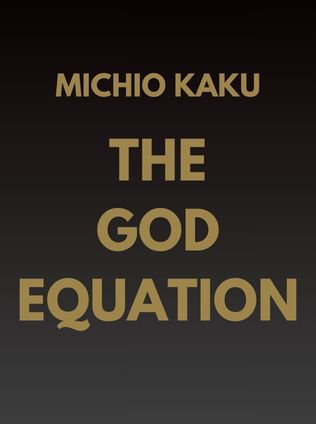
The God Equation
The Quest for a Theory of Everything
By Michio Kaku
Published 04/2021
About the Author
Michio Kaku is one of the most prominent theoretical physicists of our time, renowned for his work in string theory, a branch of theoretical physics that attempts to reconcile general relativity and quantum mechanics. Kaku was born in 1947 in San Jose, California, to Japanese immigrant parents. His fascination with science began early, as he was inspired by the works of Albert Einstein and the wonders of the universe. Kaku pursued his education in physics with vigor, eventually earning his Ph.D. from the University of California, Berkeley.
Throughout his career, Kaku has dedicated himself to exploring the deepest questions about the nature of the universe. He is not only a prolific researcher but also a gifted communicator, known for making complex scientific concepts accessible to the general public. His books, such as Physics of the Impossible and The Future of the Mind, have been bestsellers, captivating audiences with their visionary insights. In addition to his writing, Kaku is a familiar face on television, frequently appearing on programs like PBS's Nova and BBC's Horizon, where he discusses the latest developments in science and technology.
In The God Equation, published in 2021, Kaku tackles one of the most profound questions in physics: is there a single, unifying equation that can explain all the forces of the universe? This book is a culmination of Kaku's lifelong pursuit to find the "God Equation," a theoretical framework that could potentially unify the four fundamental forces of nature—gravity, electromagnetism, the strong nuclear force, and the weak nuclear force—into one coherent theory.
Main Idea
The God Equation explores the history, challenges, and potential of string theory as the key to unifying all known physical laws. Kaku argues that throughout history, the most significant advancements in physics have come from unifying disparate phenomena under a single theoretical framework. The ultimate goal of this unification is what some have dubbed the "God Equation," a single, elegant equation that could explain everything in the universe.
According to Kaku, string theory, which posits that all particles are tiny, vibrating strings, is the most promising candidate for such a unifying theory. String theory suggests that all particles and forces in the universe are manifestations of different vibrations of these fundamental strings. If proven correct, string theory could potentially reconcile the inconsistencies between general relativity, which describes gravity and the structure of the universe on a large scale, and quantum mechanics, which explains the behavior of particles on the smallest scales.
Kaku takes readers on a journey through the history of physics, from Newton's laws of motion to Einstein's theory of relativity, and from the discovery of quantum mechanics to the ongoing search for a unified theory. Along the way, he explains the concepts and mathematics that have shaped our understanding of the universe and explores the philosophical implications of a unified theory of everything.
Table of Contents
- Introduction: The Quest for the God Equation
- First Steps Toward Unification
- Electromagnetism and the Power of Symmetry
- Einstein's Relativity
- Quantum Mechanics: The Strange World of the Subatomic
- The Standard Model and Its Limitations
- String Theory: The Promise of a Unified Theory
- The Challenges of String Theory
- Conclusion: The Future of the God Equation
First Steps Toward Unification
The quest for unification in physics began with Isaac Newton, whose laws of motion and universal gravitation unified the celestial and terrestrial realms. Before Newton, it was believed that the heavens and the Earth operated under different principles. Newton’s groundbreaking work showed that the same laws that govern the motion of planets also apply to objects on Earth. This was a revolutionary step in unifying our understanding of the physical world.
Sign up for FREE and get access to 1,400+ books summaries.
You May Also Like
Factfulness
Ten Reasons We're Wrong About the World – and Why Things Are Better Than You Think
By Hans Rosling



















